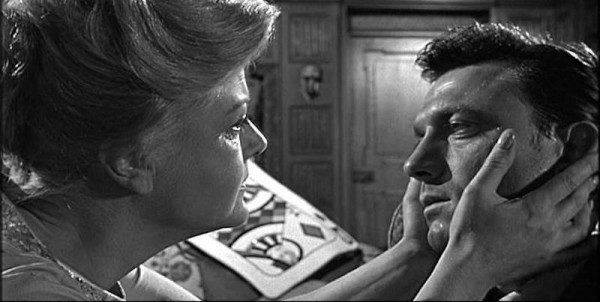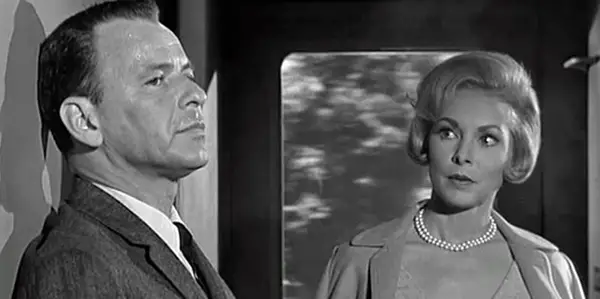THE MANCHURIAN CANDIDATE: A Cold War Thriller for the Internet Age

Amanda Garrett is a freelance writer with a passion for…
Frank Sinatra, whose 100th birthday would have been this December, was one of the great entertainers of the 20th century. He had an exceptional voice that made him perhaps the most influential vocalist in history, but Sinatra doesn’t sing a note in his best movie, the Cold War thriller The Manchurian Candidate (1962).
This deft political drama, which wouldn’t have been made without Sinatra‘s intervention, uncannily predicts many of the tumultuous events of the 1960s and beyond. The Manchurian Candidate is perhaps even more relevant today than it was 53 years ago. The film’s preoccupations with byzantine conspiracy theories and a foreign invasion carried out from within the United States are very much a part of our own uncertain age of terrorism. This film feeds into a type of paranoia that – fueled by 24-hour cable news and the ever present Sturm und Drang of the Internet commentariat – has become an almost commonplace part of American life.
Controversial Subject Matter
The Manchurian Candidate, which is based on Richard Condon‘s 1959 novel, tells the story of Korean War veteran, Maj. Bennett Marco (Sinatra). Marco is plagued by recurring nightmares about his time in Korea, and especially about his fellow officer Raymond Shaw (Laurence Harvey), a highly decorated veteran whom everyone, including Marco, describes as “the kindest, bravest, warmest, most wonderful human being I have ever met in my life.” Eventually, Marco begins to realize that the sainted Raymond is actually something of a cold fish who may be involved in a wide-ranging Communist conspiracy to overthrow American democracy.

The film adaptation of The Manchurian Candidate was the brainchild of screenwriter George Axelrod, who brought the novel to the attention of John Frankenheimer, a talented TV director who was then just beginning his career in feature films. Frankenheimer was immediately intrigued by the novel’s message regarding the polarizing ideologies of the Cold War and the equal degrees of ruthlessness displayed on both sides. “It really dealt with the whole idea of fanaticism,” he said in an interview in The Cinema of John Frankenheimer, “the far Right and the far Left being the same thing, and the idiocy of it.”
No matter how good the source material, Frankenheimer and Axelrod immediately ran into problems. No studio would finance the movie, and many big stars had turned the men down flat. Sinatra, who was always one of the bravest stars in old Hollywood, wasn’t afraid of the challenge, but he had to get the personal approval of President John F. Kennedy before United Artists would actually green light the project. Ironically, the studio was afraid of offending Soviet officials by the film’s implications of a Communist takeover of the American government, but they were unconcerned about the political assassination subplot.
A Thriller for the Age of Terrorism
The Manchurian Candidate was not a financial success when it was released in 1962, and the movie quietly disappeared for several decades either because Sinatra withdrew it from circulation after Kennedy’s 1963 assassination or because Sinatra and United Artists were in a financial dispute (sources differ on this matter). The Manchurian Candidate languished in obscurity for 2 1/2 decades until a 1988 theatrical re-release, which was accompanied by a torrent of critical praise. Frankenheimer was heralded as an underappreciated genius, and the cast was showered with praise, especially Angela Lansbury for her brilliant performance as the most ferocious mother this side of Medea.
The re-release inspired a tepid 2004 remake that, although featuring good performances from big name stars, doesn’t hold a candle to the original film. The Manchurian Candidate has only grown richer with time, and its themes of conspiracy and paranoia are especially relevant in our digital age. The movie’s intricate maze of conspiracy theories probably confused and disoriented ’60s audiences, who were used to straightforward tales about truth, justice and the American way. Today, conspiracy theories are all over popular culture, from The X Files to The Matrix (1999), and the Internet is filled with an endless array of DIY researchers whose “the truth is out there” revelations range from the groundbreaking (Wikileaks) to the ridiculous (the many wild theories that gather around celebrity love lives).

The Manchurian Candidate also taps into the pervasive paranoia of the age of terrorism. In the movie, Marco becomes increasingly frightened as he realizes that the man he remembers as “the kindest, bravest, warmest, most wonderful human being I have ever met in my life” is a cold-blooded assassin who has been brainwashed by Soviet agents, and that this broad-ranging conspiracy goes right to the highest echelons of power in the US government. Marco’s journey into this heart of darkness transforms him from a c*cky all-American hero into an anxiety-laden physical wreck whose nerves are so jittery that he can’t even light his own cigarette.
Marco’s transformation is at the heart of The Manchurian Candidate‘s message. The movie tells the audience to trust no one: every media report you hear is false, every politician is lying to you, and you’ve probably been brainwashed so you won’t remember it anyway. Audiences in 1962 were used to more straightforward and soothing entertainment (The Andy Griffith Show was very popular at the time), and they largely rejected the film’s chaotic re-imagining of American politics and power.
Five decades after The Manchurian Candidate‘s initial release, a world battered by terrorism and economic turmoil has finally caught up with Frankenheimer‘s vision. We’re certainly not in Mayberry anymore, and this fascinating film, with its harsh prophecies about the fundamental decay of American democracy, has finally caught up to the modern world.
How do you compare the original The Manchurian Candidate to the 2004 remake? Do you think there are political lessons in the film that are relevant or are some of the plot twists too over the top for your taste?
Does content like this matter to you?
Become a Member and support film journalism. Unlock access to all of Film Inquiry`s great articles. Join a community of like-minded readers who are passionate about cinema - get access to our private members Network, give back to independent filmmakers, and more.
Amanda Garrett is a freelance writer with a passion for classic films. You can catch her writing reviews and features at Film Inquiry or at her website, Old Hollywood Films.













